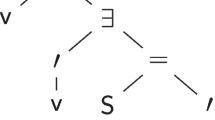Abstract
The stable model semantics (cf. Gelfond and Lifschitz [1]) for logic programs suffers from the problem that programs may not always have stable models. Likewise, default theories suffer from the problem that they do not always have extensions. In such cases, both these formalisms for non-monotonic reasoning have an inadequate semantics. In this paper, we propose a novel idea-that of extension classes for default logics, and of stable classes for logic programs. It is shown that the extension class and stable class semantics extend the extension and stable model semantics respectively. This allows us to reason about inconsistent default theories, and about logic programs with inconsistent completions. Our work extends the results of Marek and Truszczynski [2] relating logic programming and default logics.
Similar content being viewed by others
References
M. Gelfond and V. Lifschitz, ‘The stable model semantics for logic programming’, In R. A. Kowalski and K. A. Bowen (editors),Proc. 5th International Conference and Symposium on Logic Programming, pp. 1070–1080, Seattle, Washington, August 15–19 (1988).
W. Marek and M. Truszczynski, ‘Stable semantics for logic programs and default theories’, InProceedings of NACLP 89, pp. 243–256 (1989).
W.Marek and V. S.Subrahmanian, ‘The relationship between stable supported, default and autoepistemic semantics for general logic programs’,Technical Report 182–88, Computer Science Department, University of Kentucky, Lexington, Kentucky, 1988. To appear inTheoretical Computer Science. A preliminary version appears in: Proc. 6th International Conference on Logic Programming, MIT Press.
T. Przymusinski, ‘Non-monotonic formalisms and logic programming’, InProc 6th International Conference on Logic Programming, Lisbon, pp. 655–674 (1989).
T. Przymusinski, ‘Three-valued formalizations of non-monotonic reasoning and logic programming’, InProceedings of First International Conference on Knowledge Representation and Reasoning (1989).
J. You and L. Li, ‘Supported circumscription and its relation to logic programming with negation’, InProc of the North American Conference on Logic Programming, Cleveland, pp. 291–312 (1989).
N. Bidoit and C. Froidevaux, ‘General logical databases and programs: default logic semantics and stratification’,Journal of Information and Computation (1988) (in print).
C. Elkan, ‘A rational reconstruction of nonmonotonic TMSs’,Artificial Intelligence (1989) (in print).
M. Gelfond, ‘On stratified autoepistemic theories’, InProc AAAI-87, pp. 207–211 (1987).
J. W. Lloyd,Foundations of Logic Programming, Springer-Verlag, second edition (1987).
M.Fitting, ‘A Kripke-Kleene semantics for logic programs’,Journal of Logic Programming 3, 93–114 (1986).
H. Geffner, ‘Default reasoning, Minimality and coherence’, InProc. First International Conference on Knowledge Representation and Reasoning, pp. 137–147 (1989).
C.Baral, J.Lobo and J.Minker, ‘Generalized well-founded semantics for logic programs’,Technical report, Dept. of Computer Science, University of Maryland, College Part Md 20742 (1989).
C.Baral, J.Lobo and J.Minker, ‘Generalized disjunctive well-founded semantics for logic programs’,Technical report, Dept. of Computer Science, University of Maryland, College Park Md 20742 (1989).
W.Marek, ‘Stable theories in autoepistemic logic’,Fundamenta Informaticae 12, 243–254 (1989).
T. Przymusinski, ‘Three valued stable models and well-founded models of logic programs’,Technical report, Dept. of Computer Science, University of Texas at El Paso (1990).
A. Van Gelder, K. Ross and J. S. Schlipf, ‘Unfounded sets and well-founded semantics for general logic programs’, InProc. 7th Symposium on Principles of Database Systems, pp. 221–230 (1988).
R.Reiter, ‘A logic for default reasoning’,Artificial Intelligence 13, 81–132 (1980).
KurtKonolige, ‘On the relation between default and autoepistemic logic’,Artificial Intelligence 35, 343–382 (1988).
W. Marek and M. Truszczynski, ‘Relating autoepistemic and default logics’,Technical report, Department of Computer Science, University of Kentucky at Lexington (1989).
W. Marek and M. Truszczynski, ‘Autoepistemic logic’, to appear inJACM.
K. R.Apt, H. A.Blair and A.Walker, ‘Towards a theory of declarative knowledge’, In J.Minker (editor),Foundations of Deductive Databases and Logic Programming, pp. 89–148. Morgan Kaufmann Pub., Washington, D.C. (1988).
Author information
Authors and Affiliations
Rights and permissions
About this article
Cite this article
Baral, C.R., Subrahmanian, V.S. Stable and extension class theory for logic programs and default logics. J Autom Reasoning 8, 345–366 (1992). https://doi.org/10.1007/BF02341854
Received:
Accepted:
Issue Date:
DOI: https://doi.org/10.1007/BF02341854



